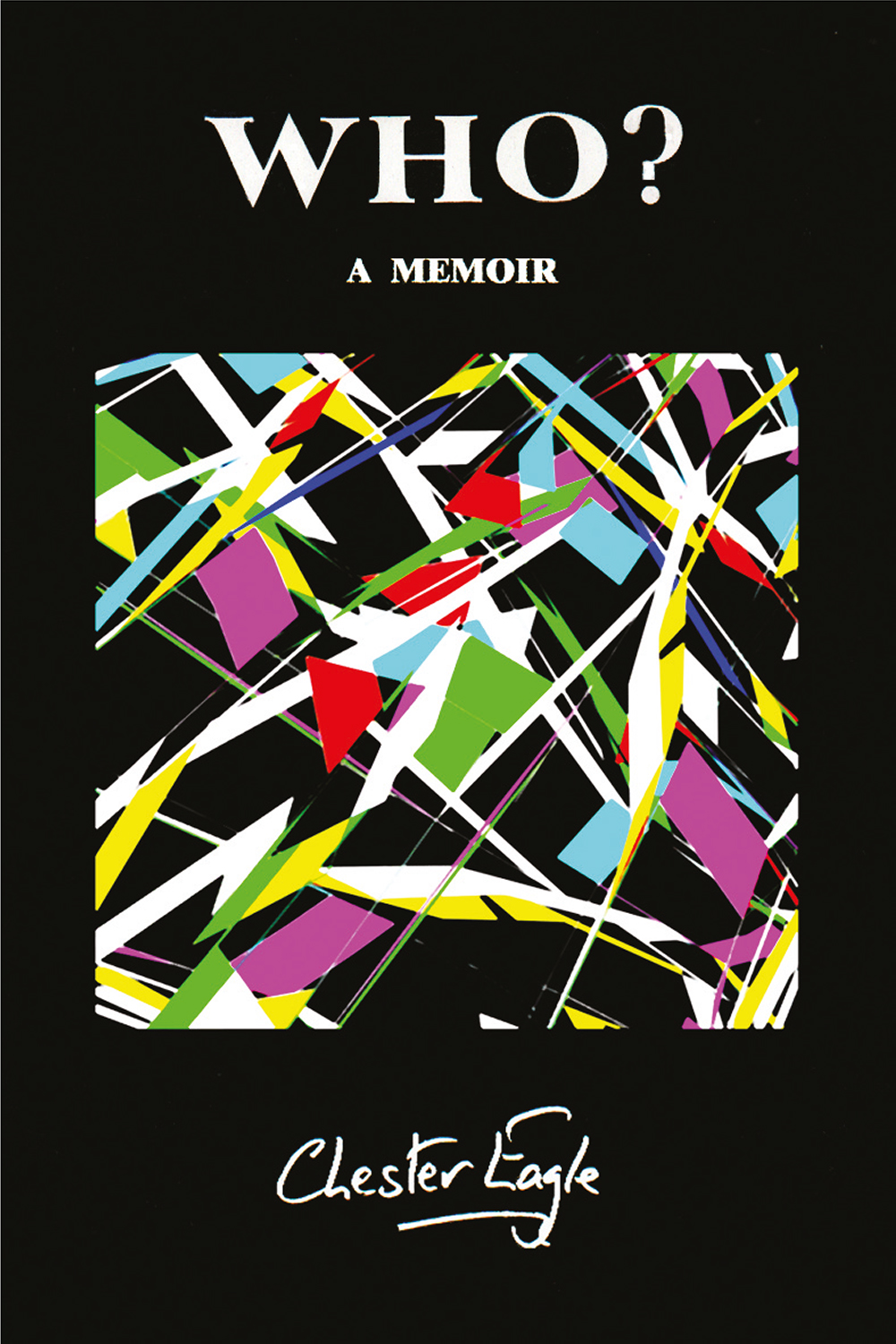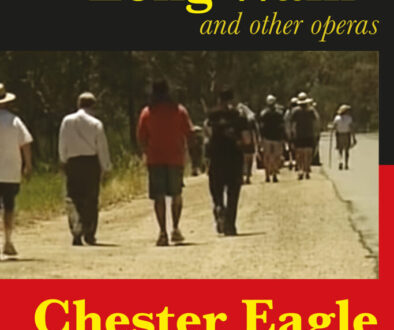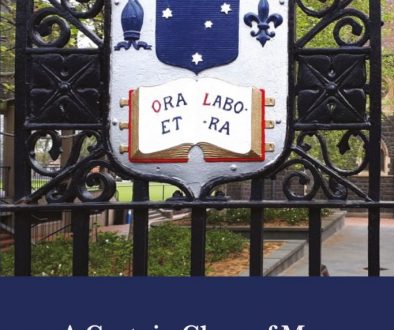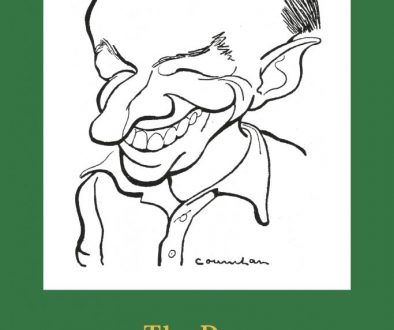Who?

Written by Chester Eagle
Design by Vane Lindesay
Image by Rodney Manning
Layout by Karen Wilson
Circa 3,120 words
Electronic publication by Trojan Press (2008)
Who?:
I have a feeling that this story may irritate you, and writers don’t want that to happen. From Shakespeare down, our aim’s to please. But sometimes we can’t even please ourselves …
… because we’re puzzled by what’s happened. It refuses to make sense. The only thing we can do is share it, which means giving the problem to others to see if their working out is better than ours.
To begin, we have to go back many years. My story has two main characters, apart from myself, so I’ll start when they first married. Dale and Gwyn. She used to say, ‘I don’t know why it’s spelt that way. There’s nobody Welsh in my family. Maybe they made a mistake. More likely they just didn’t care. It’d be typical of my family to do something and not know why.’ Since I only met her after she was married, in a town where Dale was working, far from her family, I couldn’t comment. Her family? Well, we can’t avoid having them, can we, even if we don’t think much of our inheritance.
Gwyn was sweet, and the opposite of forceful, except that sometimes people who use no force can exert themselves in ways that other people don’t know how to counter. Persistence is a strength that tougher people underestimate, and Gwyn was nothing if not persistent, as I was to find in later years …
I’d known Dale for some time when he turned up teaching in a town not so far from where I was at the time. He got a school residence because he was married; that was news to me. I drove down to see him, and met Gwyn. She referred to me as ‘one of Dale’s old friends’, and busied herself about the stove. Biscuits and tea. Dale and I talked boisterously and Gwyn learned what I could see she’d never heard before, that Dale and I had met when we had to do military training at Puckapunyal, to provide Australia with soldiers ready for to fight The Communists – the terrors of an earlier age. We laughed loudly about the stupidities of army life, and in particular a man called Charlie Shaw. Charlie was in the regular army (we were ‘nashos’, meaning national servicemen), he was a sergeant (three stripes), he wasn’t very bright, and he was one of the regulars in charge of a company full of university students. Charlie’s six year contract was running out and he told us, often and vehemently, that he wouldn’t sign for another term. ‘Another six years doing this? Y’d need fuckin rocks in ya fuckin head!’ ‘When do you have to decide, Charlie?’ we’d ask, and he’d tell us the date: it was just before we’d be allowed back to university, our training finished. As the time – our time – approached, we became chirpier, and Charlie grew quieter. He got drunk once or twice and we had a feeling there was something he wasn’t telling us. He became subdued. He stopped grumbling about the army, polished his boots and went for us if we didn’t look smart on parade. It dawned on us one day that Charlie’s sign-on date had passed, and he was still with us. He should have dropped in, wearing civilian clothes, to shake hands and wish us well. But he hadn’t. We knew what that meant. He’d signed on for another six years. We felt sorry for him, and didn’t know what to say. Eventually someone asked about it, and he said, ‘Ya gotta stick with the things ya know and this is the only thing I know. You think about that when you get back to school.’ He managed to sound contemptuous of us – mere children, in his estimation – but we were heading along the paths we’d chosen, and Charlie was going to be in the army till he died, or they tossed him out …
Dale and I laughed about Charlie, and felt sorry for him too. We had so many things we wanted to do. One of them was to walk all over Wilson’s Promontory, not far from where Dale & Gwyn were living. ‘Sealer’s Cove!’ I said. ‘And that’s only the first trip. After that, I want to do the lighthouse!’ We set a date for early December, and I drove to Foster, Dale and Gwyn’s town, and we headed off early the following morning: Dale and I, that is, because Gwyn had no interest in bush walks. ‘You can tell me all about it tonight. Have a great time!’ I don’t think I gave her a thought for the rest of the day as we tramped through the bush, up slopes and down, through swampy patches, until we reached the cove where sealers had done their business long ago, and then we walked back, getting to the car as darkness fell and a moon rose as if it felt that things should move in orderly procession. We drove back to the dinner that Gwyn had cooked and she listened as we talked, talked, talked …
We agreed that night that we’d do the lighthouse walk on the same day in a year’s time, and we did. I say this in the matter of fact way that we made the arrangement, and then made it fall out as intended, but something about it gives me pause, now, thinking about it as I must in order to write it down. The same day, with a year in between? I see Dale and I, two young men with heaps of confidence, thinking, as we sit in Gwyn’s kitchen, drinking tea and coffee with hot water from the stove, in a modest weatherboard cottage that had had any number of residents before Dale and Gwyn, and would have as many more, thinking that we can manage the future as far ahead as the following year. If this is strange, or somehow too big a claim to make, the fact is that we did what we’d arranged: a year later, to the day, more or less, we set off again, Dale and I, with little packs on our back with apples, water and a sandwich, from my car in its parking spot to the lighthouse far away. What a marvellous walk! I remember no signposts, though there may have been one or two, only tracks through the coastal heath made by walkers like ourselves, and that was sufficient. On the way back, we’d know the way because we’d remember it. On the way forward, the way south, we were driven by our desire to achieve the lighthouse. We didn’t need actually to get there, we needed merely to see it, and the ocean, the rocks, the waves, the vista, the feeling that the ocean stretched as far away as our futures, and I, at least, and I think Dale felt the same, I at least thought that my future was rosy indeed.
What else could it be?
So we crossed the coastal heathland, fairly high, with glimpses here and there of Rodondo Island, which Dale told me about because he’d heard fishermen discussing it. They’d managed the considerable difficulties of scaling its rocky sides, then getting off again. Why? There was nothing there. Only a view, but you could get just as good from the mainland, from the lighthouse. It seemed to me, even then, that humans need destinations, however needlessly – that is we have needs, and we need our needs, pointless as they may be – and that Rodondo Island was fairly useless, except that it was there, rising from a shimmering sea on a day when a cloudless sky stood above Dale and I, two walkers with heaps of energy, and an apple and a sandwich to eat when eventually we sat on a log, rubbing the muscles of our legs.
We reached the high land looking down on the lighthouse. It looked marvellous, towards the end of a rocky point above the waves. We took a look at the sun, and headed back. We recrossed the coastal heath, following the tracks, we got back to the car and headed for Dale’s kitchen, or should I say Gwyn’s kitchen, because, as a year ago, she was by the stove, ready with biscuits and tea before she served a meal. I was unmarried at this stage and it seemed good, to me, to have a woman in one’s home, somebody to make one’s returns into something different from the ending they would otherwise have been.
The next day we made another trip and this time Gwyn came along. We travelled to a patch of mountain ash trees, the species which had dominated the South Gippsland hills. Settlers had cleared them, cut them down and burned them, felling the trees at the top of the slopes so that they’d crash onto trees lower down which had been cut through in order to weaken them so that they too fell when trees higher up crashed down. I sometimes suspect myself of caring more about this holocaust of trees than I do about humans slaughtering each other, which is a practice we cannot, it seems, prevent. Dale was something of an expert on insects, and he set off into the forest. I came back after a few minutes to the car. Gwyn had never left it. I sat in the front seat and she in the back, and I could tell that she was sad. I asked her why, and she told me. She’d been pregnant for a little while, she said, and she’d lost the child. She’d been a nurse, and she told me about the bleeding. I listened respectfully. I’d not heard a woman talk about losing a child before, and it seemed to me that there could be no consolation except to have another.
Gwyn did have another, and another after that, but I never saw these children, nor did I ever see Gwyn again because by the time the first of them was born she and Dale had left Foster, and soon after I’d moved back to the city too. We lost contact, and when I ran into Dale, years later, it was at a concert, he told me he was living … somewhere I’ve forgotten, and he made no mention of Gwyn. Players were coming on stage for the second half of the program, he went to his seat, and I never saw him again.
There was an occasion, not so long ago, when I thought I did, but more of that anon.
I’ve also told you that I never saw Gwyn again. This is true, but misleading. Let me add to what I’ve told you.
I married, moved back to the widespread city, and immersed myself in my work and children. Years passed. I thought I saw Dale at another concert, one night, but the man was a long way away and I may have been wrong. Years passed. Then, one day, I got a phone call from Gwyn. She asked how I was, was I married, did I have children? I told her. She told me sadly that she was no longer with Dale. I said I was sorry to hear it. If her voice had given me the impression that she wanted to talk about it, I’d have asked, but there was something strange, hopeless really, in her tone. She’d been through a storm, had survived, but didn’t know what to do any more. It was as if she’d almost forgotten how to live, but remembered, dimly, that she’d once been alive. I felt that it was to make contact with that time that she’d found me in the phone book. She chatted for a while, telling me nothing of any importance, except by that defeated voice, then said she must let me go. I’d be wanting, she said, to see if my children were safe. I said I should have a look, and she hung up.
I went into the garden, feeling sad. Where were her children? With her, or with Dale? I wondered how much use the vague-sounding woman I’d been speaking with would be to her youngsters. Not much good at all, I felt. I was busy though, I’d never known Gwyn very well, and I forgot about her, which means putting her out of mind. Humans are ruthless about where we direct our attention, because we have to be, especially when we’ve got children making demands. As the saying goes, years passed. And continued to pass. Every two or three years – rough estimate – I’d get a phone call from Gwyn, still sounding lost. She’d ask sweetly how I was, how my children were (they were growing up, of course), she’d chatter about nothing for a while, then say she should let me go. I must be busy. In all these calls she never gave me a phone number, an address, or the suggestion that we should meet. I wasn’t sure that I existed, for Gwyn, as anything more than a memory, a person from the past who was mysteriously contactable by dialling a certain combination of numbers. Ring 9497 1018 and hear a voice from the lost time. I thought of ringing Dale, and went as far as looking him up in the phone book, but stopped myself. What could I say to him without telling him about Gwyn’s calls, and how could I mention them without inviting his dismissal of her? I did nothing. I might be useless but I felt I should be loyal.
Years passed. All sorts of things happened in my life. Every two or three years I got a call from Gwyn, always vague, always within reach of normal, if only just, sad-sounding, persisting with life no matter how much it made her suffer. Where were her children? She never mentioned. What did she want? Apparently a few minutes conversation with someone she’d never really known, but might have, in a limited sort of way. A connection, perhaps, with a time that seemed, in looking back, to have been good? I couldn’t say.
Years, as I keep saying, passed. My son, well and truly grown up now, bought a house, and I sometimes drove to see him. We made it our practice to lunch on an occasional Sunday at a restaurant in that very Chinese area, Box Hill. One day, as we walked back to my car, he went into a shop to get supplies. I stood at the door, surrounded by Chinese newspapers, plates, teapots and casseroles made in China or Taiwan, vegetables, and top-opening fridges full of frozen things to lick. A man came in, with a woman, and I looked at him in surprise. It was Dale, or was it? The couple moved past the cash register and into the shelves, with me looking after them, filled with curiosity and doubt. Dale? I hadn’t seen him since I’d run into him at the concert, and that must have been thirty years before. Thirty years? I considered. Yes, thirty seemed about right. Good heavens! I looked at the shelves, but the two people were out of sight. I watched, waiting for them to come back. Minutes passed, this time. Eventually the couple came to the checkout and had their purchases stuffed into the plastic bags for which Chinese people feel no shame. They were in no hurry to leave; they stood near me, talking about something, then she, the woman, started to inspect the ceramics on show. He, the man – Dale? – waited, while I examined his face. He showed no awareness of me. Eventually she lost interest in the pottery and they moved to pass through the plastic strips. When he was looking into the light coming through the plastic, away from me, I said quietly, ‘Dale?’
And again, ‘Dale?’
He must have heard, but went straight ahead. It hadn’t been Dale after all. But how alike! The resemblance! I want to say, ‘I could have sworn …’ but it wouldn’t be true. I hadn’t been sure, but I’d felt surrounded by a feeling of connection with something from my past. However, I’d been wrong. The man hadn’t answered to ‘Dale’ and he must have heard the word, even if his thoughts were somewhere else. You can’t ignore your own name, unless you’re in a spy-drama and your identity’s got to be kept hidden …
Let’s not get into that!
I dropped my son at his place and I drove home. Into the lounge, glance at the phone, red light flashing.
Message. I pushed the button.
It was Gwyn. She was sorry she’d missed me. She’d hoped she might find me at home. As usual, she left no number to ring, no address, no contact. She was, as always, a voice floating in from somewhere far behind, out of sight, untraceable, wanting to reach me but leaving no means to cause it to happen. ‘Goodbye,’ the answering machine said, and it, Gwyn, addressed me by name. I sat there, feeling sad. Then I realised that I’d missed something. I pressed the button and went through the sadness again. When Gwyn stopped, the machine gave me the time she’d rung. About forty minutes earlier. I thought. I started to work out how long it had taken to get from the restaurant to the shop, from the shop to the car, then to my son’s house. How long had it taken my son to unload? How long had we talked before he went inside? It was soon very clear. Gwyn had rung me at much the same time that I was staring at a man who made me think he was her former husband, Dale, a man who turned out not to be Dale because he didn’t respond when I said the name that was pressing firmly in the front of my mind …
… but what had been going on at the back? Gwyn was ringing me and I was ‘seeing’ Dale. The man wasn’t Dale but the connection was as absolute as if he had been. Some awareness of Gwyn, causing the phone to ring in my house in another suburb, had caused me to liken a stranger to the father of her children, whom I hadn’t seen for thirty years. Very puzzling, I said to myself, very puzzling, I say to you, dear reader, and that’s why I began this piece with an apology because, knowing that I couldn’t satisfy myself I knew I wouldn’t be able to satisfy you. Your pardon is begged and as for me, I shall go on puzzling.
The writing of this book:
A few words about the writing of the memoirs So bitter was my heart, Keep going!, Who?, and At Baldy’s feet.
These four short pieces, now being issued as mini-mags, take my writing back to the territory of my first book, Hail and Farewell! An Evocation of Gippsland, 1971 (reissued as House of Trees, 1986). I began and finished the first part of this book, headed ‘The Men from Snowy River’, at the end of 1967, during my last weeks in Gippsland. In 1968, and by then established in Melbourne, I began to think about the rest of the book, and I went through a period of uncertainty. Put simply, there was a conflict in me: was Gippsland my subject, or was I going to write about my own development during those Gippsland years? They had been very influential, taking me from an immature young man to someone who had some idea of how the world worked. After a few weeks of indecision, I decided that I was unready for autobiographical writing, and should make the evocation of Gippsland my task. This I did. I scrapped the short sketches I’d written thus far, and started again, under the heading ‘Landscape and people’: I would, if I could, keep myself out!
Thirty-eight years later, I found my thoughts returning to things which had affected me in those years. I realised that there must have been many turning points, important steps taken, or opportunities accepted or rejected, which I had regarded as part of the ebb and flow of life, without examining them for their long-term effects. The Gippsland book I’d published had dealt with things I was prepared to acknowledge, but I was also aware, especially after the passage of a few more decades, that I’d chosen to keep quite a lot out of sight.
This was partly a matter of reticence, natural enough, partly a matter of not realising the importance of various moments in my development, and it came about also because I was still, all these years later, acting in the shadow of decency’s double standard. There were things I knew about but wasn’t prepared to say. I think many, perhaps most, writers face this problem, and it’s a case of what I shall call the duplicity of honesty. I can be frank, perhaps even brutally honest about someone else, but can I be as frank, as honest, about myself? I think that like many other writers my answer would have to be a rather pathetic ‘Occasionally yes, but mostly, no.’
The passage of years does bring about changes, however, and the memoir ‘So bitter was my heart’ brings much into the open that I hadn’t been able to deal with before. The key to the writing of this piece is in the division of the writer’s voice – an old man, a young man. The young man is scornful of much that goes on around him, and lustful in a way that his teaching position requires him to conceal. The old man, no longer hemmed in by these aspects of life in a small town, is both curious and forgiving. What did happen, way back then? The honesty, the release, and the discovery bring the old man great rewards. The older man, in denying the denial, is able to find humour, a great range and variety of character, and the fascination of a powerful sexual experience.
And there is music, too, in this memoir, such wonderful music, being discovered, examined and explored by a mind, a soul, that doesn’t know its limits – its own limits nor the music’s limits – yet. Yet. That word almost turns time around, or at least it divides the river of time into before and after. This is a valuable tool in searching out one’s origins and/or stages of development. What was I like before? And after? What had happened, in between? When I reconsider my Gippsland years, I remember an afternoon, late in the twelve-year period, when I was following a newly created track alongside a stream somewhere in the Dargo area. I was not long married and my wife was with me. We came upon a group of people – road workers, I think – and I stopped to talk to them. I suppose I asked how much further the track went, and I must suppose that their answer was not far at all, because we turned around and went back. The moment lasts, lingers in my mind as a turning point of sorts, as if, in that decision to turn the car around, I was turning my back, forever, on the years of exploration which were my life in Gippsland.
Was this really so? Or a construct of the writing mind that developed later, a mind ageing and moving away from what it had been? I cannot say, but that is the sort of question that bubbles to the surface when one goes in search of what was once there, but not allowed to surface when it might, and perhaps should.
‘Keep going!’ was the next of these four pieces to be written. It took me by surprise. I had decided to write about the young woman I call Simone, because the moment when her boyfriend’s – ex-boyfriend’s – car passed us on the highway had returned to my thinking, and it seemed an oddly dramatic dismissal of him. A dismissal without any words exchanged. I set out to write it, and realised, somewhere along the way, that I had done something much worse myself. Looking back on my behaviour, I thought it had been shameful, yet there was nothing I could do about it now, and, as I tried my hardest to remember things said, thought and done all those years ago, the fact was that there was only a limited amount that I could recall. There were gaps all over the place. This caused me to think about the way humans ‘forget’; forgetting, I think, is a controlled process, carried on somewhere just out of sight of the controlling mind – if it is controlling; perhaps it is merely signing the papers prepared for it by subservient but clever underlings, if I may speak of the human mind divided in that way.
So I had to write about myself, as well as Simone. And Richard, and Don. Looking back, I realised that I had very little idea of what had been going on in the minds and feelings of any of us. What are we doing, in our youth? In our struggles toward maturity? How do we know we aren’t making the most terrible mistakes?
I don’t think we do know. I think we’re operating on impulse, and this is a devil-take-the-hindmost way of conducting a life. There is a saying that youth is wasted on the young, but perhaps it can be twisted to say that youth is something richly deserved by those who are ignorant enough to be going through it.
I suppose this sort of thought could be extended but I want to leave it now. Looking back, and reconsidering all the ingredients of ‘Keep going!’, I find myself quite shaken. People are pursuing each other, and pursuing their own unrevealed destinies, occasionally forced by forces half, or perhaps entirely hidden from themselves, and making decisions they didn’t know were forming in their minds until they brought themselves into the open. ‘Keep going!’ Simone said, and I was worse, in staying silent. One likes to think, as one grows older, that one is ‘managing’ life, but the experience of writing ‘Keep going!’ leaves me quite unsure.
And now ‘Who?’ It’s a simple story, in that the facts that can be shared with the reader require no special skill to put on the page. The real question in the writer’s mind is, what is going on in my mind? The narrator, at the end of the story, hearing what’s on his answering machine, and connecting it with the happenings in a shop not long before, doesn’t know what’s going on. This puts him in an anti-narrative position, in that we normally expect narrators to know and narratives to tell us. This, this time, is beyond the narrator because he’s puzzled and wishes to share his puzzlement with the reader. It could be said that this story is an invitation, by me to any readers at all, to consider the limits of the human mind. Why? Because we can be sure that there are things going on outside those limits and that these forces are affecting us, whether we know about them or not. We can also be sure that the operational limits of the human mind, and its inbuilt weaknesses are affecting, every day of our lives, the conclusions we are drawing about the way the world is working around us. It’s like getting into a 2008 model jet and discovering that everything in the cockpit, the pilot’s controls, are circa-1920 in design and effectiveness. We still have to fly, but we’d better know our limitations before we take off!
‘At Baldy’s feet’ is very much an aftermath to my earlier writing. Mount Baldhead is one of the points by which the ‘Landscape and People’ section of my Gippsland book had located itself (the other was Castle Hill). Castle Hill was for me the mystical mountain and Baldhead the locus of my attempts to create a unified meaning: a sort of home-made replacement for religion, I now think. Both places, of course, were peaks. High. It occurred to me that I had a number of memories located in the great basin that sits before Mount Baldhead, and I decided to try to bring these ‘lower’ experiences together. They don’t have the reach, the resonance, of things that came to me on or near the peaks – try Wainwrights’ Mountain – but I wanted to say them, and here they are.



